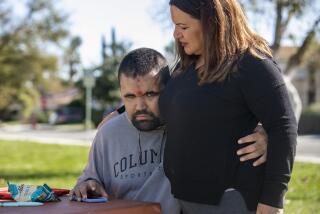Elliot’s Legacy : As their baby lay dying, Bill and Dana Schreiner waited for word in a ‘stark’ room at County-USC. Now they are working to remodel that area where families anguish.
- Share via
Bill and Dana Schreiner couldn’t hide from their pain if they wanted to.
Every morning when they step onto the front porch of their Mount Washington home, County-USC Medical Center is still out there on the horizon, a sprawling white symbol of a parent’s worst fear.
It is there the ambulance took Dana and their 5-month-old son, Elliot, after he rolled off their bed, caught his head in a dresser drawer, and stopped breathing on Friday, March 19.
Bill got Dana’s frantic call that afternoon in his Hollywood office and raced across town praying out loud: “Don’t let this be true, don’t let this be true, God, let this be a mistake.” He found Dana in a dreamlike, hysterical daze, screaming and crying and pounding the walls, unable to stand for more than a few minutes before slumping in fear and grief. The crisis snapped him into a state of hyper-alertness. Everything, including the agony, became chillingly acute. For the next 48 hours, as Elliot lay dying in a chrome-sided hospital crib, the couple moved between their child’s bedside and a small room on the sixth floor where family and friends gathered to offer support. Bill and Dana welcomed the care their son received. They were less appreciative of the sixth floor’s deserted corridors, the “stark, dark” family waiting room, or the small space nearby where Dana slept on a cold linoleum floor.
Saturday night, while the couple aimlessly hiked the hallways of a floor that is largely empty except for the intensive care unit, Bill told Dana: “God, if I had a million dollars, I’d fix this place up. . . . “
Three months later, as Bill and Dana struggle through a fog of grief, they are raising money and making plans to refurbish and remodel that grim limbo where families anguish while God and science sort out their children’s fate.
*
The sign on the swinging doors outside County-USC’s pediatric intensive care unit (PICU) is curt: “Visiting Hours, 5 minutes out of every hour. Parents and Grandparents Only.”
But that formality is belied by the room itself, where balloon and teddy bear wallpaper and nurses in cheerful pastels battle endlessly against the gloom of parental despair.
In one corner, a baby knocks loose a tracheotomy tube. A monitor cuts loose with a shrill cheep-cheep-cheep , momentarily drowning out a music box that tinkles “Rock-a-Bye Baby.”
That particular baby does not sleep gently. Her tiny body is swaddled in wires that run from her arms and chest to various monitors, and various tubes that poke out of her nose and throat and chest. A green blood pressure cuff grips her tiny leg and a little red light bulb shines on the baby’s toe--a pulse oximeter to alert the nurses should her blood oxygen levels drop.
Only critically ill or severely injured children are admitted here--kids shot or stabbed, kids mangled in car accidents, kids with life-threatening asthma attacks or head injuries. Most of their parents are poor.
As Jaron J. Gammons, pediatric pavilion administrator, explains simply: “The insured usually go somewhere else.”
Bill Schreiner arrived there with the image of an underfunded hospital for the destitute stuck in his mind.
Demented with fear, he called his father, a prominent Virginia physician: “You’ve gotta help me get Elliot out of here!”
Bill is an actor, director and screenwriter; Dana an actress and photographer. They’re hardly rich, but they do OK--and they have insurance through their guilds that would gain them admittance anywhere.
Bill’s father paused, though, then told his son what others have since confirmed: County-USC’s pediatric intensive care unit is among the finest in the country.
“People think that because you treat poor people, the quality of care is poor,” says nurse specialist Carolyn Steadham. “That’s not the case. We pull off a lot of miracles. We save children who shouldn’t have survived and who wouldn’t have if they went to another hospital.”
But poverty does have an effect.
Many parents who bring their children to County-USC are new to the country from Mexico or Central America. And even those who speak English may not understand modern medicine.
“They may have relied on a curandero , a folk healer, back in their village,” Steadham says. “They’ve never been in an ICU before. Suddenly everything blinks and flashes.”
She raises her chin to the ICU: “Imagine how intimidating this is for a parent. One minute your child is out in the yard playing, the next she’s in here stuck full of needles and tubes. She can’t talk to you anymore.”
Often, those parents feel as if they’re watching a bad movie of someone else’s life, she says: “They’re exhausted. It drains them of everything they have. They go into the room, hold their child’s little hand, then go back and sit. It’s dreadful.”
ICU nurses encourage parents and grandparents to be with their children, and are prepared for the normal spectrum of parental reactions to a hospitalized child: shock, fear, denial, grief, guilt, rage.
“They’re mad at God, they’re mad at each other, they’re mad at us, they’re even mad at the child--’Why did you walk in front of that bus!’ ” Steadham says.
As she tours the ICU, one couple smiles over a crib adorned with a “Happy Birthday” banner. Their toddler smiles and babbles “Momma.”
In the next crib, another child lays cradled by a menagerie of stuffed bunnies and pandas. His mother holds the child’s unresponsive hand. Tears spill down her cheeks.
“From my experience, parents go through just as intense pain as the children,” says Steadham. “I’ve had parents get out of their chairs and vomit. They feel so helpless, it’s disabling.”
“As angry as we get at parents sometimes, we know we’re going to have to send the child back home. So we spend as much energy on the parent as we do on the sick kid.”
That said, Steadham also acknowledges that the staff’s priority is to save a child’s life.
“There’s competition for resources,” she says. “If we spent money . . . on the waiting room, we couldn’t live with ourselves.”
When the Schreiners offered to spruce up the place, though, the staff responded enthusiastically.
“Most times,” the administrator says, “people want to get away from the setting that’s caused them so much hurt.”
It’s 10 at night, and a little red light flashes like a heart monitor atop the County-USC complex as Bill pulls his Trooper into the dark parking lot outside the pediatric pavilion.
Dana remains reluctant to retrace her path to the hospital. Bill braces himself and enters through a back door.
Ignoring the tangle of painted lines that guide neophytes to their destinations, he walks directly to the elevators and pokes the button for the sixth floor.
He and Dana have thought a lot about this floor since their 48 hours here, he says as the doors open.
They’ve come to see it as “a crossroads for a lot of people, a transition zone where lives are changing in significant ways.”
Most parents who stumble frantically down this hallway, he says, will see their children rally and revive. They’ll pack their kids up and take them home.
Even then, “the scare will change them forever,” he says, his voice barely audible over a lonely echo of footsteps that is distinct to late-night hospital corridors.
Bill thinks the administrators figured he and Dana were nuts when they first spoke of their ideas. He feared their plans would collide with bureaucracy and deflate into inaction.
Instead, Gammons and others offered encouragement and assistance. After several meetings, there was progress.
When Elliot died, Bill and Dana asked friends to contribute to a remodeling fund in lieu of flowers, and they received enough cash to get started.
A cousin who’s an architect volunteered drawings. A friend who’s an interior decorator sketched out plans to dress up the bleak environment with carpets, new sofas, comfortable chairs, a silk plant, a clock, paintings and new mini-blinds.
Bill pokes his head into the parents’ waiting room, a small, institutional space “where the hard reality sets in.”
An African-American family--father, mother, and daughter--is clustered on cracked vinyl chairs, clearly settling in for a long night.
Ducking back into the hallway, Bill whispers: “We realized, you have to look at that waiting room as a campsite. That’s what happens, people come and camp out.”
He and Dana hope to expand and remodel the waiting room and a small kitchenette down the hall to accommodate people who arrive on short notice and are unwilling to go home until their children are well.
There will be beds where a couple can rest and hold each other, a bathing area, a place to change diapers, and an area with a play structure for other children that parents often have in tow.
Only parents who have endured days and nights in such a setting could possibly know the shortcomings, Bill says, talking at the mile-a-minute pace of someone trying to fill a void.
For instance, when Dana arrived, there was no safe place for her to put her purse. So they plan to install small lockers.
And if funds allow, there’s another piece of the project they’d like to complete.
In his notes, Bill wrote that there had to be a better place for the hard discussions and intimate moments: “The room should feel private, safe, comfortable, and non-threatening. . . .”
On the second day of Elliot’s hospitalization, doctors gently told Bill and Dana that life-support measures no longer offered any hope.
The couple retreated to a small nurse’s station, where, amid the inevitable interruptions, they tried to make the most painful decision of their lives.
“You’re his mother,” Bill said. “Stay with him, and listen. He’ll tell you what to do.”
Dana stood once again by her “perfect, pudgy, angelic baby,” who lay beside a Pez candy dispenser and a sack of plastic farm animals brought by his 5-year-old brother Quinn.
From the moment he was born, she says, Elliot seemed “wise.” Now she had the clear sense that he “was in the room, but not in his body,” she says. She felt that he was watching over her, saying he could wait till she and Bill were ready to let him go.
Later that evening, doctors removed Elliot from life support. Dana dressed him in an outfit a friend had sewn, a white gown embroidered with a bunny and the words “Have Suit Will Travel.”
Bill and Dana took turns holding him, softly singing his favorite silly songs. Dana hugged him in to her chest as his heart slowed and then stopped.
“At five months, Elliot really left no legacy,” Bill says, slumping quietly onto the familiar hospital floor. “To some, he was just a . . . poof! “
Down the hallway, the anxious black father comes out of the PICU clutching an armload of blankets for his family, who are uncomfortably camped out down the hall.
Bill’s eyes cloud and he drops his head into his hands.
The Elliot Schreiner Memorial Parents’ Waiting Room won’t dilute a family’s pain, Bill acknowledges when he looks up again. But it’s something.
More to Read
Sign up for Essential California
The most important California stories and recommendations in your inbox every morning.
You may occasionally receive promotional content from the Los Angeles Times.










